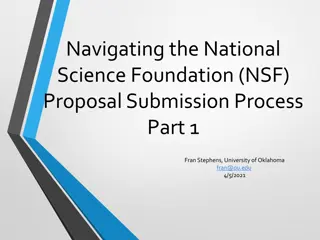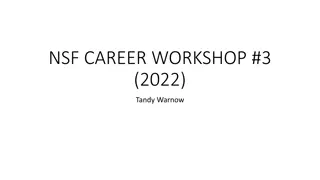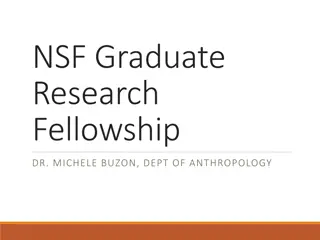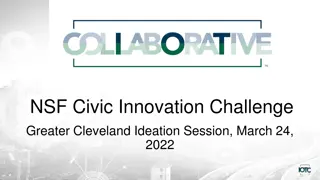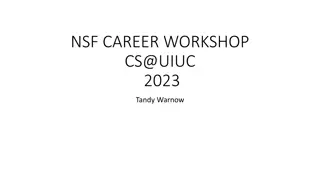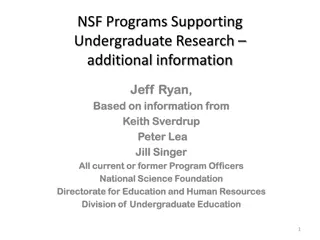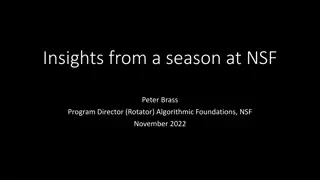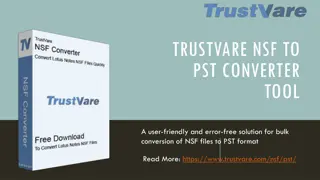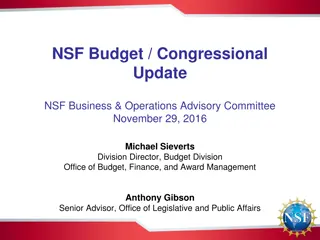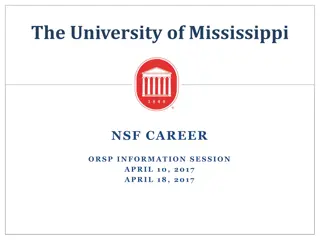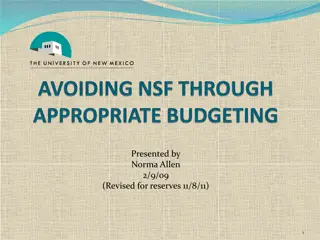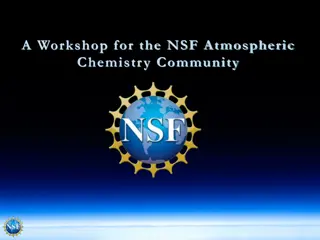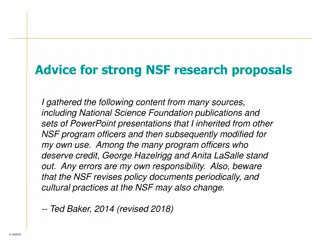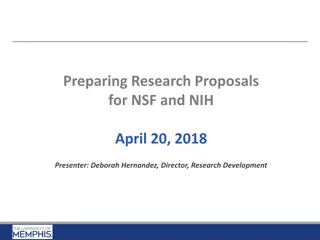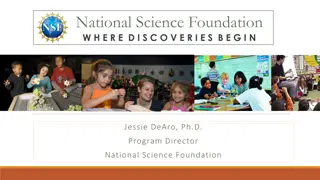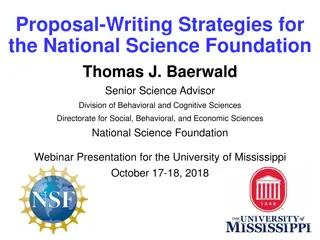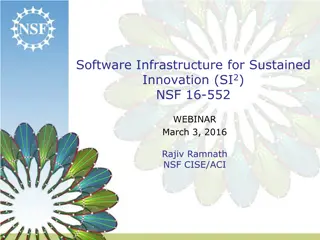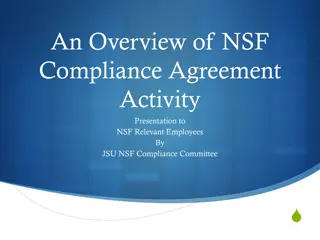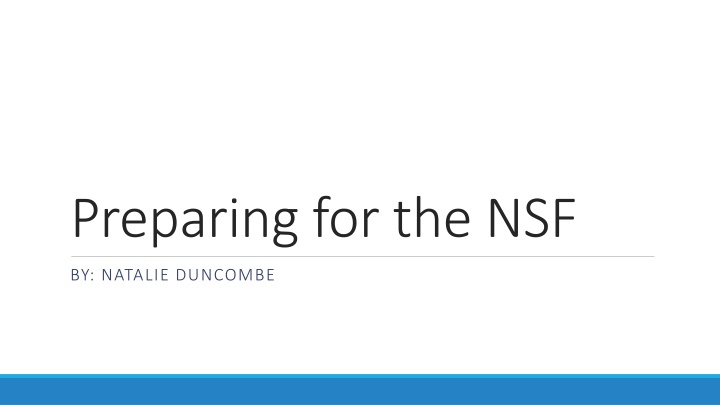
NSF Fellowship: Guide for Eligibility, Application & Resources
Prepare for the NSF Graduate Research Fellowship Program with eligibility requirements, application overview, and helpful resources for pursuing research-based Master's and Ph.D. degrees in the U.S.
Uploaded on | 0 Views
Download Presentation

Please find below an Image/Link to download the presentation.
The content on the website is provided AS IS for your information and personal use only. It may not be sold, licensed, or shared on other websites without obtaining consent from the author. If you encounter any issues during the download, it is possible that the publisher has removed the file from their server.
You are allowed to download the files provided on this website for personal or commercial use, subject to the condition that they are used lawfully. All files are the property of their respective owners.
The content on the website is provided AS IS for your information and personal use only. It may not be sold, licensed, or shared on other websites without obtaining consent from the author.
E N D
Presentation Transcript
Preparing for the NSF BY: NATALIE DUNCOMBE
Agenda Overview of NSF Eligibility Application Overview Review Process and Criteria Reference letters Writing your statements Personal Statement Research Proposal
What is the NSF? The NSF Graduate Research Fellowship Program (GRFP) helps ensure the vitality of the human resource base of science and engineering in the United States and reinforces its diversity. The program recognizes and supports outstanding graduate students in NSF-supported science, technology, engineering, and mathematics disciplines who are pursuing research-based master's and doctoral degrees at accredited United States institutions. Perks: Prestige Three-year annual stipend of $34,000 along with a $12,000 cost of education allowance for tuition and fees The freedom to conduct your own research at any accredited U.S. institution of graduate education you choose Source: http://www.nsfgrfp.org/general_resources/about/
Eligibility To be eligible for the NSF GRFP, you must: Be a US citizen, US national, or permanent resident Intend to pursue a research-based Master's or Ph.D. program in a GRFP-supported field Be enrolled in an eligible program at an accredited United States graduate institution, with a US campus, by fall 2017 Be at an early stage in your graduate career Have completed no more than twelve months of full-time graduate study (or the equivalent) as of August 1, 2016. The "no more than twelve months" limit applies to your entire education career, not just your current program. If you have completed less than twelve months of your Ph.D. but have previously completed a Master's degree, you would not be eligible for the GRFP, unless you meet the criteria for an extenuating circumstance as described in Section IV of the Program Solicitation. The complete set of GRFP eligibility guidelines is published in the Program Solicitation. All applicants should read the program solicitation carefully before applying. The program solicitation NSF 16-588 contains the official and only eligibility criteria for the 2017 GRFP competition. Source: http://www.nsfgrfp.org/applicants/eligibility
Application Overview Deadline: Social Sciences - Thursday, October 27, 2016 Application location: https://www.fastlane.nsf.gov/grfp/Login.do Main Application Parts: Education and Work Experience Upload unofficial or official transcripts Three Reference Letters Personal, Relevant Background and Future Goals Statement Graduate Research Plan Statement
Other Resources GRFP Information: http://www.nsfgrfp.org/ Helpful links http://grfpessayinsights.missouri.edu/ http://chrisblattman.com/2012/09/09/phd-students-writing-an-nsf-application/ http://www.alexhunterlang.com/nsf-fellowship
Review Criteria Intellectual Merit Criterion: the potential of the applicant to advance knowledge based on totality holistic review of the content in the application, including the two statements, the strength of the academic record and accomplishments, and the reference letters. Broader Impacts Criterion: the two statements, personal, professional, and educational experiences, the future plans and prior accomplishments in the integration of research and education, the potential for future broader impacts, and the reference letters. They evaluate these both in terms of your proposal and your personal attributes. Volunteer and service contributions can mean as much as having a smart proposal. Source: http://www.nsfgrfp.org/applicants/application_components/merit_review_criteria
Review Process Each application is reviewed by two reviewers The top scores from those rounds are then reviewed by a third reviewer, and from that the honorable mentions and awards are chosen The applicants are divided into those with no graduate school and those who have started and compared accordingly, with less awards going to those who have started graduate school. The NSF also works to distribute awards amongst many different institutions and geographic locations the awards do not all go to Harvard students although some years they do better than others. Sample rating sheet: http://grfpessayinsights.missouri.edu/reviewer-comments-sample.pdf
Review Process The typical reviewer will be different from the typical top 15 admissions committee member. Each reviewer will have a slightly different interpretation of the of Broader Impacts and Intellectual Merit Broader judge pool means that your reviewer is more likely to weight non-economics research experiences, such as extra-curricular activities and leadership positions, more highly than when you applied to graduate school.
Reference Letters Help your reference writer with this information as much as possible The Reference Writer will be asked to answer the following: How long have you known the applicant, and in which capacity? If you are the candidate s research supervisor, you must comment on the originality of his/her research statement, and the role, if any, you had in assisting the student with this application. What is the applicant s potential for contributing to a globally-engaged STEM workforce? What are the Intellectual Merit and Broader Impacts demonstrated by the applicant? Source: https://www.fastlane.nsf.gov/NSFHelp/flashhelp/fastlane/FastLane_Help/grfp_faqs_applicants.htm#52
Statements General Advice 1. Be concise and format your statements effectively. Remember that reviewers will have limited time to read your application. Clearly labeling different sections and addressing explicitly each requirement will make the statement more effective and clear for reviewers. Source: http://www.nsfgrfp.org/applicants/application_components/statements
Statements General Advice 2. Keep in mind that NSF does not just seek to fund scientists and engineers; NSF seeks to fund future STEM leaders. Use the statements to show leadership potential, self-starter capabilities, and the ability to work well with others (scientists, students, people in the community, etc.). Show passion, motivation for a STEM career, and initiative in your past research and other experiences.
Statements General Advice 3. Be yourself. An application that conveys a clear sense of who you are as a person, with a narrative that has energy and flow, will generally be better received than an application that is impersonal and flat. Remember that the GRFP recognizes individuals based on their demonstrated potential for significant achievements in science and engineering. That is, the potential of individuals is evaluated, not just the proposed research.
Statements General Advice 4. Use appropriate scientific form (hypothesis, figures, references) in the Graduate Research Statement. 5. Don't get bogged down in the specifics, or be overly technical. Instead of elaborate details on theory, focus on the rationale for your studies and the existing literature as it supports your proposed work. Although make sure to recognize when applying as a graduate student the bar is a little higher. While reviewers will generally be knowledge experts in your general field, they probably will not be experts in your specific proposed research topic.
Statements General Advice 6. Develop a consistent theme in both of the statements, weaving together your personal story with your academic and career plans and past experiences to make a compelling case why NSF should award you the fellowship. The decision will be based on your demonstrated potential for significant achievements in science and engineering. Keep in mind that reviewers will read your complete application package.
Statements - Pay Attention to Formatting Applications that do not adhere to the guidelines will be returned without review (this has happened!!) Source: https://www.fastlane.nsf.gov/NSFHelp/flashhelp/fastlane/FastLane_Help/grfp_faqs_applicants.htm#26
Personal Statement - Prompt Please outline your educational and professional development plans and career goals. How do you envision graduate school preparing you for a career that allows you to contribute to expanding scientific understanding as well as broadly benefit society? Describe your personal, educational, and/or professional experiences that motivate your decision to pursue advanced study in science, technology, engineering or mathematics (STEM). Include specific examples of any research and/or professional activities in which you have participated. Present a concise description of the activities, highlight the results and discuss how these activities have prepared you to seek a graduate degree. Specify your role in the activity including the extent to which you worked independently and/or as part of a team. Describe the contributions of your activity to advancing knowledge in STEM fields as well as the potential for broader impacts (See Solicitation, Section VI, for more information about Broader Impacts). NSF Fellows are expected to become globally engaged knowledge experts and leaders who can contribute significantly to research, education, and innovations in science and engineering. The purpose of this essay is to demonstrate your potential to satisfy this requirement. Your ideas and examples do not have to be confined necessarily to the discipline that you have chosen to pursue.
Personal Statement - notes Treat this as an extended cover letter Qualifications Research experience & interests Career goals Highlight items like awards and volunteer experience that would generally appear on your Resume. 3 page limit
Personal Statement - Sample Outline Intro Probably similar to when you applied to Graduate School Provide motivation for your chosen research proposal topic Intellectual Merit (actually use headers if possible) Will be similar to your graduate application Talk about research, academic awards, and academic contributions Emphasize why you are uniquely qualified to address your chosen proposal topic Broader Impact Describe the impact you hope your research will have on the field (it s okay to reiterate what you ll say in your proposal) try to be specific and not too hokey If you have relevant leadership/volunteer/extra-curricular experience try to use those to demonstrate your capacity for leadership in the field beyond your research
Research Proposal - Prompt Present an original research topic that you would like to pursue in graduate school. Describe the research idea, your general approach, as well as any unique resources that may be needed for accomplishing the research goal (i.e. access to national facilities or collections, collaborations, overseas work, etc). You may choose to include important literature citations. Address the potential of the research to advance knowledge and understanding within science as well as the potential for broader impacts on society. The research discussed must be in a field listed in the Solicitation (Section X, Fields of Study).
Research Proposal - notes Not tied to Proposal if you win Write on a topic you know or have researched Be detailed- write equations, explain where you ll get data 2 page limit be concise! Clearly mark sections that cover Intellectual Merit and Broader Impact Talk to Economists and others and revise, revise, revise

